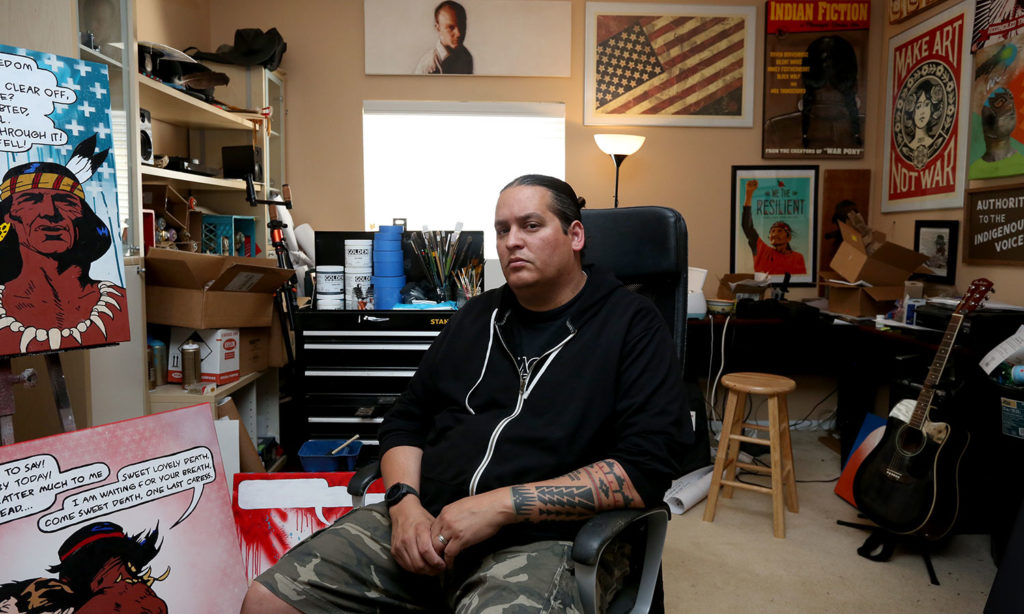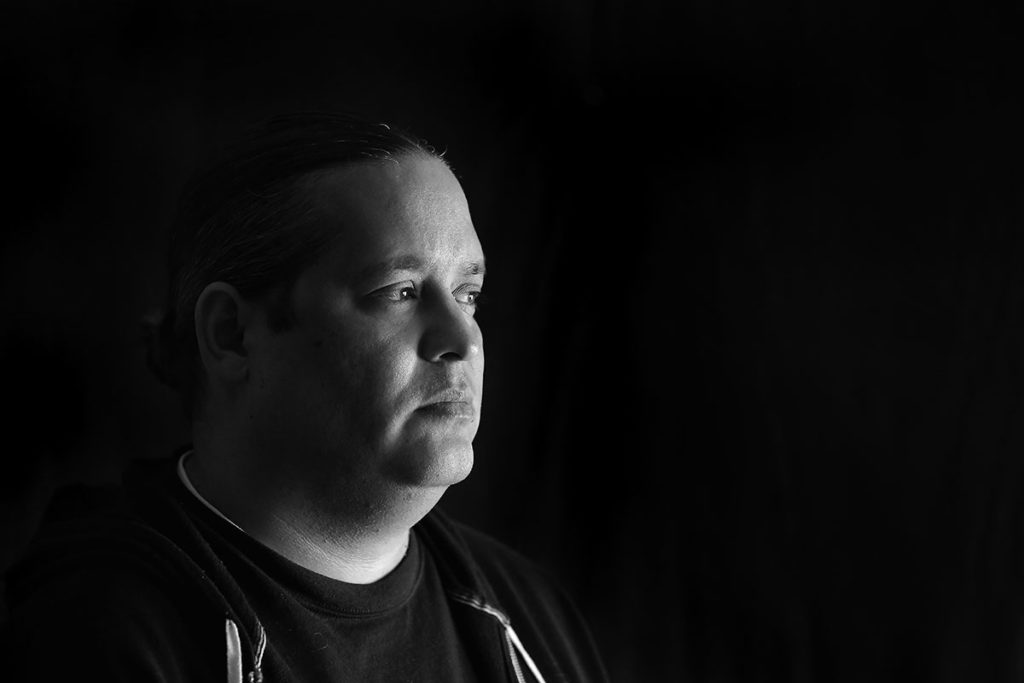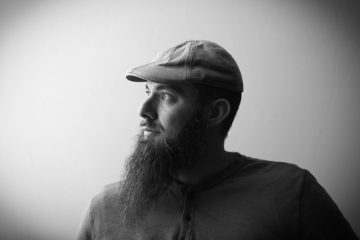Gregg Deal is a member of the Pyramid Lake Paiute tribe with origins in what is now known as Nevada. He is a contemporary artist who is known nationally for his incisive wit and strong willingness to provide voice to the oft-dismissed Native perspective.
In the first part of this conversation — “Gregg Deal | Disturbing Spaces” — we talk about heritage and the prospect of white guilt, and bust stereotypes by charging right into them.
In this second part, we learn more insights and history from Gregg, as he shines light on truths, dreams and first steps toward reconciliation.
Humanitou: You said in an interview with Slug Magazine, “History is usually used as a tool to amplify greatness, and sometimes as a weapon. Indigenous people use history as a tool to obtain truth.” What do you think you’ve figured out as your truth?
Gregg: Within our society, I think we have different definitions of truth. I think that there is a truth that exists regardless of your perception or where you’re at that you can’t dispute.
For example, George Washington, our first president, revered as being one of the Founding Fathers of this country. Before he was president, he was a general.
When he was a general, he was a party to killing native people and, in one situation, he and his soldiers skinned Seneca people from the waist down. They would take those skins and make boots out of them.
That’s not about perception. It has nothing to do with my truth or your truth. It has to do with the truth. These events happened. These events did take place. And regardless of where you stand, that’s horrific.
Those truths are smattered throughout American history, and those are the truths that are often omitted in American history.
So the lack of context that we have to those events, those things that happened separate people’s understanding of why Natives are even saying anything at all, why Natives would have the audacity to say, “I am my ancestors’ greatest dreams that were never realized.”
Because we were supposed to be gone. It was American policy that indigenous people were supposed to be eliminated or force-assimilated into society so that those cultures and those things never existed again.
And yet, here I am. Me saying that, maybe that’s my truth.
The mortar of this country was built with Indian bodies. That is an incredibly disturbing and powerful thing that people in this country need to recognize. The recognition of those things can help us move to a place of having a country that can actually have integrity in the things that we built.
There is a moral obligation that every American citizen has to the history of this country. If that information is omitted and nobody ever knows about that, then it in turn eliminates that moral responsibility.
So, when somebody like me or when any Native person stands up and says something, and somebody goes, “What are you complaining about? You guys get free school. You get free handouts. You don’t have to pay taxes. You have your own space. The government is giving you handouts like crazy” …
All of which, every last thing I just said, is completely false. We are the lowest common denominator of every possible economic situation that you could imagine.
We are the poorest people in the country. And only in a country this twisted could you take the poorest people of the country and convince yourself they’re getting something you’re not.
That’s ultimately where we end up, in terms of helping anybody to understand what’s happening, why it’s happening and how it’s happening.
Abraham Lincoln signed off on the largest mass hanging in American history. It was all Dakota men, 38 people at the same time. In Minnesota, a week before the Emancipation Proclamation was to be enacted. That is incredible.
And that is not to be divisive about Abraham Lincoln, but it is to say this happened. Why did that happen? How did that happen? What is the perspective of those things? If this man is this great, benevolent emancipator, why is he signing off on just killing all these Indians?
And if you go back far enough in the story, you begin to realize that those Indians are being killed because they killed a bunch of white settlers. If you go back even further, you find out they were all on a reservation.
Reservations aren’t these plots of land that were benevolently given to the Indian people. They were plots of land under which Natives were kept under armed military guard. By all intents and purposes, most reservations began as a prisoner of war camp.
So, they were stuck there. And every reservation space has an Indian agent. And an Indian agent is specifically there to facilitate the conversation between these tribes and the federal government, and in most cases to provide provisions.
The government’s saying, “Look, you’re going to stay here and we’ll provide you food for this amount of time, and we’ll help you become farmers and build industry and become like a part of what we’re trying to build here.”
So, those Indian agents would get food and they were meant to give those provisions out to the Native people. Well, that specific group of people, their Indian agent was withholding food. And when he was giving them food, it was rotted. The people were starving.
So, what happened? All the men take up arms. They sneak off the reservation area and go on raiding parties, trying to find food and provisions for their families. And settlers died as a result of that.
Those men got hung for killing white people, and they killed white people because they were trying to get food, because the person who was in charge, the Indian agent, was not making sure they were taken care of and being fed. And that is twisted as hell.
That is not about my perception. That is not about my truth versus your truth. That is about the truth. These are the events that happened, and this is why they happened.
When I talk about truth, I talk about truth being used as a weapon to promote greatness, as American history generally is used, as opposed to a tool to be used as power in truth.
History in those truths are the things that continue to validate our arguments. They continue to validate our existence. Yeah, there was a policy meant to erase us. So for me to be able to stand here and say, “This is inappropriate,” was never a thing.
For me to even take burning sage or sweet grass as a prayer, a ceremonial aspect of what Native people do was illegal until 1978, when an act of Congress created the American Indian Religious Freedom Act.
So, in a country that’s built on religious freedom, an Indian could be arrested for burning sage, for wearing ceremonial garb, for doing any ceremonial practices at all in the United States. That’s crazy.
But those are also the things that I think could help us reconcile the country that we’re in. I don’t criticize America because I hate America. I criticize America because I believe that it can be better, and it should be better.
If we have these ideals like freedom of religion and free speech and free assembly and free press, and everything else that we rest our laurels on, if those things are true, we should always be searching after those truths.
But in order for us to truly reconcile that, in order for us to truly have those things, we must first reconcile and recognize the things that happened that built this country. Because the mortar of this country was built with Indian bodies.
And that is an incredibly disturbing and powerful thing that people in this country need to recognize. The recognition of those things can help us move to a place of having a country that can actually have integrity in the things that we built.
I don’t know what it is about the white folks that came here, man, but they liked writing about the things that they did. So, it’s all on record. To me, the idea that somebody can say something is fake or not true just because it doesn’t make sense to them . . . ?
Our constitution is framed after the constitution of the six civilized tribes of the Northeast. These tribes had a constitution of how they worked together. Do you think that George Washington didn’t know about that constitution? Of course, he did. Those are the people that he was working in and around.
The settlers had a relationship with those people. So our constitution is everywhere in this country, but there’s never been recognition of that input and that existence unless it’s convenient to the narrative that’s being pushed out.
We know about the Plains Indian Wars because it plays a role in romanticizing westward expansion, in having these headdressing Indians out there fighting as warriors against … whatever.
Humanitou: You refer to some truths in the form of facts. We are living in a time where facts are rejected. There is no common sense of truth. A significant portion of the population in this country at this time, undoubtedly, would greet what you’re saying with hostility. Evidence be damned.
So, what is your sense of how your truth and how the truth is being received in this country during what I’ll call a period of cultural and political dimness?
Gregg: I think — and this would probably piss a lot of people off — that is the stupid man’s argument. The stupid man’s argument is: I don’t believe it.
Like, “You’re not even going to think about it? You’re not even going to talk about it? You’re not even going to try to process that?” Nothing that I’ve said is something that I just sat in my house and made up.
Christopher Columbus, when he came here, he thought he was in India, so he called them Indians and– By the way, he didn’t actually come here.
He was never on the mainland. He landed in what is now the Dominican Republic. He believed he was in India until the day he died. He never went out as a benevolent discoverer. He was trying to find a shorter route to India to get riches faster to bring back to the Spanish crown.
When he got here — and the reason that I know this is he kept journals of everything he did — the most desirable Indians that he had were young girls and young boys.
They would kidnap them, and they would give them to their people and ship them out. They started, essentially, the very first sex trafficking thing in the Western hemisphere. He talks about these young girls, 10 years old, being the most desirable. By his own hand.
So, it’s really easy, because we have so much romantic nationalism on things like Christopher Columbus, to say, “I’ve never heard that, so I don’t think that’s true.”
But in terms of romantic nationalism, how likely is it that they’re going to be like, “Listen, Columbus discovered America and was also really into 10-year-old girls.” That’s not going to happen. That doesn’t feed into the purpose of romantic nationalism.
The purpose of romantic nationalism is to take all of the great parts, all of the parts that build up this sentiment of greatness and to put that at the forefront.
It doesn’t take much to go back and to see these things. It doesn’t matter if you’re on the left or you’re on the right, there’s a lot of issues. It’s not fake.
People have been writing books forever. In this country, books have established every aspect of where people are at, what people are doing, what they’re thinking, how they’re thinking. And the only thing that changes is perspective.
We can say, “People came here and they wanted to establish America. They wanted to make something great and they wanted to have religious freedom. They landed at Plymouth Rock, met some Indians, had Thanksgiving dinner — and we go forward in greatness.”
But the pilgrims, in their effort to usurp religious persecution, they also killed Indians at a pretty good clip. Because they believed that they were savages. Those are our foundations. It doesn’t take much to realize those things happened.
I don’t know what it is about the white folks that came here, man, but they liked writing about the things that they did. So, it’s all on record. To me, the idea that somebody can say something is fake or not true just because it doesn’t make sense to them–
Humanitou: It doesn’t fit their model of what they already believe, or want to believe.
Gregg: Absolutely. My entire existence questions the validity of the American dream. And that’s hard. I appreciate that that’s hard for some folks to process. We’ve been told some stuff for a long time.
Humanitou: You’ve described yourself as a “proprietor of broken dreams.” Are you familiar with Langston Hughes’ poem, “Harlem”? I want to read it for you quickly. It’s super-short. It goes:
What happens to a dream deferred? / Does it dry up like a raisin in the sun — or fester like a sore and then run? / Does it stink like rotten meat — or crust and sugar over like a syrupy sweet? / Maybe it just sags like a heavy load — or does it explode?
I’m curious, when you’re referring to broken dreams, what are those? What are your dreams? What’s your heavy load?
Gregg: That’s a really powerful piece.
I did a piece in, I want to say 2011, maybe. It’s called “Dreamers and Losers.” It was about the way that we uphold people because they have dreams or they fulfill their dreams. But we also look down on people because they are going after their dreams.
“Admission is free for dreamers and losers.” It’s this really strange existence in America, where everybody says you can be what you want to be, you can do whatever you want to do.
But at the beginning, when I made that piece was when we were having the greatest struggle in my household, financially. And people were telling me and my wife that we needed to stop, that I needed to get off my ass and go get a job. And that we were just dreaming and that nothing was going to happen.
That idea of being a dreamer and a loser, those go hand-in-hand. The idea that if you have a dream, then you’re going to be a loser. And if you’re a loser, then it’s probably because you had a dysfunctional dream.
Where our entire country is supposed to be built on that … somehow?
If I went to school for business and after school I got an unpaid internship, where I didn’t make any money but I was working for free, nobody would bat an eye at that.
Then you get an entry level position and you’re making pennies. You might have to have a second job to make it work. Nobody bats an eye at that, because there’s a system in place to facilitate that.
As an artist, that’s not the case. As an artist, it’s almost understood immediately that you’re going to be poor and starving.
I even cringe when people ask, “What do you do for a living?” Because I know what they’re thinking the moment it comes out of my mouth.
There’s these ideas put in place to tell us this is the way the world works while simultaneously we’re supposed to subscribe to this idea that anybody can be anything that they want.
I realize there’s practicality in there. You have to make a living. You’ve got to pay a rent or mortgage. You’ve got to be able to do these things to function in society.
On my Instagram, to say “proprietor of broken dreams” is totally tongue in cheek. But also, when I first wrote that, it was in that moment where people were telling me that the things that I wanted were not attainable.
Because I was chasing after my desire to do something, to provide for my family using the talents and abilities that I have, which just happen to be in creative fields, that I was a dreamer. And as a result of being a dreamer, that makes me a loser.
And so I am the “proprietor of my broken dreams.”
I’ve had this incredible opportunity to fulfill everything that I set out to do, and am still continuing to fulfill everything I set out to do.
I know as an indigenous person that my people are relegated to an artistic corner in Santa Fe, that we’re often times not allowed to participate in the greater art world as artists that have value. When somebody refers to me, they’ll refer to me as a native artist.
I’m an artist that happens to be Native. Yeah, I listen to some traditional songs and prayers. I also like Kendrick Lamar and Rollins Band.
We have this duality of our existence, but we still have to fight for equal representation in spaces that don’t allow us to be anything other than the relic, that don’t allow us to make art other than pottery and textiles, that don’t allow us to have a voice that is about navigating a modern space.
Like, looking at what is Native futurism? What does contemporary Native art look like when it’s not informed by a Western buyers’ market? It doesn’t look like cowboys and Indians anymore, I can tell you that. The fight ends up being about trying to figure out where you fit in with all that.
And I believe, on some level, Americans are all just trying to figure out a way to fit in with their stuff. They’re trying to figure out a way to succeed. They’re trying to figure out a way to provide for their family. Everybody just wants to connect to something.
Read the Humanitou conversation, “Gregg Deal | Disturbing Spaces.” Watch Gregg’s TEDxBoulder presentation below.






